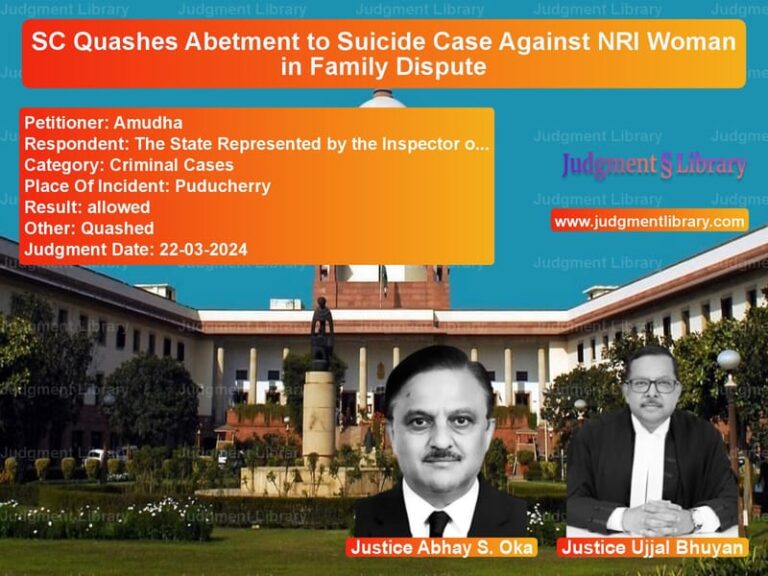SEBI’s Duty to Disclose Investigation Reports: Supreme Court’s Landmark Ruling
The Supreme Court recently delivered a crucial judgment on the disclosure obligations of the Securities and Exchange Board of India (SEBI) concerning investigation reports. The case involved a dispute between the appellant, T. Takano, and SEBI, regarding the non-disclosure of an investigation report that formed the basis for a show cause notice issued to the appellant.
The judgment holds significant implications for corporate governance, investor protection, and the principles of natural justice in regulatory enforcement proceedings. Below, we provide an in-depth analysis of the case, the arguments presented by both sides, the Court’s findings, and its ultimate ruling.
Factual Background
The case arose from an investigation conducted by SEBI into financial misstatements at Ricoh India Limited. The appellant, T. Takano, served as the Managing Director (MD) and Chief Executive Officer (CEO) of the company between 2012-2015. In 2016, forensic auditors Price Waterhouse Coopers (PWC) discovered financial misstatements for the financial years 2012-2013 to 2015-2016. SEBI initiated an investigation under its Prohibition of Fraudulent and Unfair Trade Practices (PFUTP) Regulations.
SEBI issued a show cause notice against the appellant based on the investigation findings, alleging his involvement in fraudulent financial misstatements. However, the appellant contended that SEBI had not disclosed the full investigation report, thus violating his right to defend himself adequately. The appellant challenged SEBI’s non-disclosure before the Bombay High Court, which ruled in favor of SEBI, stating that the investigation report was an internal document. Dissatisfied with this outcome, the appellant approached the Supreme Court.
Petitioner’s Arguments
Senior counsel for the appellant, Mr. Ashim Sood, made the following key submissions:
- Duty to Disclose: The investigation report was a crucial document forming the basis of SEBI’s show cause notice. Therefore, it must be disclosed to allow for a fair defense.
- Regulatory Framework: Under Regulation 10 of the PFUTP Regulations, SEBI is required to consider the investigation report before taking enforcement action, making it an essential part of the adjudicatory process.
- Principles of Natural Justice: Failure to provide the full report violated the principles of fairness and transparency, as the appellant was unable to scrutinize or challenge SEBI’s findings.
- Global Best Practices: In jurisdictions like the United States and the European Union, regulators disclose investigation reports in enforcement proceedings, ensuring due process.
Respondent’s Arguments
SEBI, represented by senior counsel Mr. C.U. Singh, countered these arguments with the following points:
- Internal Nature of the Report: The investigation report was an internal administrative document and not intended for disclosure.
- Selective Disclosure: SEBI had already disclosed relevant portions of the report relied upon for issuing the show cause notice.
- Market Sensitivity and Confidentiality: The report contained sensitive market information and third-party data, the disclosure of which could harm the integrity of financial markets.
- RTI Exemptions: The Right to Information Act, 2005, exempts certain documents from disclosure when it involves commercial confidence, third-party information, or the prevention of financial market disruption.
Supreme Court’s Analysis
Regulatory Framework
The Supreme Court examined the regulatory framework governing SEBI’s actions under the PFUTP Regulations and noted that Regulation 10 explicitly requires SEBI to consider the investigation report before initiating enforcement proceedings.
Principles of Natural Justice
The Court emphasized that any material that is relevant to the adjudicatory process and affects the noticee must be disclosed. Non-disclosure, it held, deprives the noticee of an opportunity to present an effective defense, violating fundamental fairness.
Exceptions to Disclosure
While upholding the right to disclosure, the Court recognized certain legitimate exceptions. It held that SEBI may withhold parts of the report that:
- Contain confidential third-party information that does not concern the appellant.
- Include market-sensitive data that could disrupt financial stability.
- Reveal investigative strategies that could hinder future regulatory enforcement.
The Court directed SEBI to carefully redact only such portions while ensuring full disclosure of all material that concerns the appellant.
Conclusion
The Supreme Court ruled in favor of the appellant, setting aside the Bombay High Court’s judgment. It held that SEBI must disclose all parts of the investigation report that directly pertain to the charges against the appellant while allowing limited redactions for third-party confidentiality and market stability.
SEBI was directed to furnish the investigation report within one month, followed by a reasonable period for the appellant to respond before final adjudication.
This landmark judgment strengthens the principles of natural justice and transparency in regulatory enforcement actions, ensuring that entities facing action from SEBI are granted due process and access to all relevant information.
Petitioner Name: T. Takano.Respondent Name: Securities and Exchange Board of India & Anr..Judgment By: Justice Dhananjaya Y Chandrachud, Justice Sanjiv Khanna.Place Of Incident: Mumbai, India.Judgment Date: 18-02-2022.
Don’t miss out on the full details! Download the complete judgment in PDF format below and gain valuable insights instantly!
Download Judgment: t.-takano-vs-securities-and-excha-supreme-court-of-india-judgment-dated-18-02-2022.pdf
Directly Download Judgment: Directly download this Judgment
See all petitions in Corporate Compliance
See all petitions in Company Law
See all petitions in unfair trade practices
See all petitions in Shareholder Disputes
See all petitions in Bankruptcy and Insolvency
See all petitions in Judgment by Dhananjaya Y Chandrachud
See all petitions in Judgment by Sanjiv Khanna
See all petitions in allowed
See all petitions in supreme court of India judgments February 2022
See all petitions in 2022 judgments
See all posts in Corporate and Commercial Cases Category
See all allowed petitions in Corporate and Commercial Cases Category
See all Dismissed petitions in Corporate and Commercial Cases Category
See all partially allowed petitions in Corporate and Commercial Cases Category







